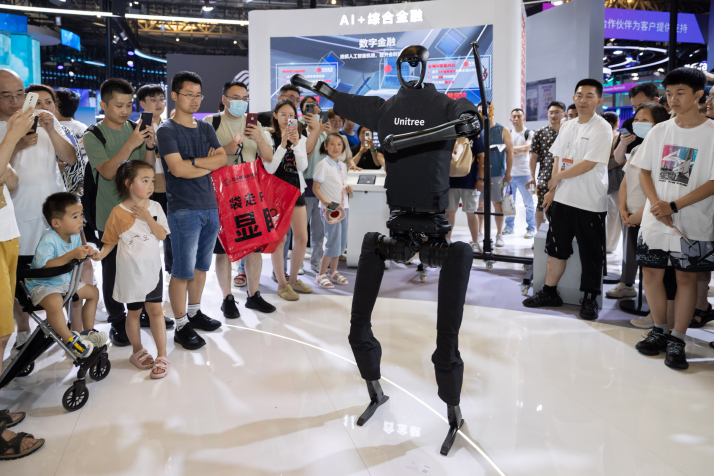| Business |
| China's private sector is highly encouraged to enhance its capabilities | |
|
|
 President Xi Jinping, also General Secretary of the Communist Party of China Central Committee and Chairman of the Central Military Commission, attends a symposium on private enterprises in Beijing on February 17 (XINHUA)
Some 20 years ago, 10-year-old Wang Xingxing watched a documentary that featured a bipedal robot designed by Marc Raibert, now President of U.S.-based robot company Boston Dynamics. That moment planted the seed for his future in innovation. Today, operating in China's private sector, Wang's company, Hangzhou-based Unitree Robotics in Zhejiang Province, is a globally recognized name in producing high-performance, general-purpose quadruped and humanoid robots. Wang, CEO of Unitree Robotics, began his entrepreneurial journey at a humble starting point. He had no background at prestigious universities or experience as an executive in a big company. When Unitree Robotics was founded in 2016, it consisted of Wang alone and raised only 2 million yuan ($275,000) in funding. The outlook of the entire industry was quite gloomy at that time, so he faced many challenges. Between 2017 and 2018, the company's first round of funding ran out, forcing him to use his own money to pay the employees' wages. Fortunately, they secured new investment in early 2018 and managed to recover. In the second half of 2018, when their products began to be launched, the cash flow started to stabilize. In 2024, Unitree Robotics reportedly held more than 60 percent of the global humanoid robot market, with its post-investment valuation standing at 8 billion yuan ($1.1 billion). Wang's story reflects a broader trend in China's private economy, where private enterprises and entrepreneurs focus on strengthening, optimizing and expanding their businesses, in a bid to make strong contributions to advancing modernization. Associated with hashtags like "born in the 1990s," "private entrepreneur" and "robotics," Wang has been gaining traction on Chinese social media platforms since he attended a high-profile symposium on private enterprises in Beijing on February 17. "The private sector enjoys broad prospects and great potential on the new journey in the new era. It is a prime time for private enterprises and entrepreneurs to give full play to their capabilities," President Xi Jinping said at the event. He called for promoting the healthy and high-quality development of the private sector. Against the backdrop of China's economic transformation entering uncharted waters, ongoing international uncertainties and the accelerating technological revolution, the symposium has attracted widespread attention. Innovation and high quality The symposium emphasized the leading role of the private economy in technological innovation and high-quality development. Six entrepreneurs shared their opinions and advice at the symposium. Among them, five represent the technology industry, namely Ren Zhengfei, founder of information and communications technology infrastructure provider Huawei; Wang Chuanfu, Chairman and CEO of electric vehicle maker BYD; Yu Renrong, Chairman of fabless image sensor chip maker Will Semiconductor; Lei Jun, Chairman of smart consumer electronics manufacturer Xiaomi; and Wang Xingxing. Liu Yonghao, who also spoke at the event, is chairman of agricultural conglomerate New Hope Group. Entering the new era, China's economic development has shifted from a stage of high-speed growth to a phase of high-quality development. The development of the "new economy," driven by new technologies, is progressing well and has become a new track for the development of private enterprises. Currently, more than 92 percent of China's hi-tech enterprises are private firms. After Leng Youbin, Chairman of China Feihe, one of the country's largest suppliers of infant formula, attended the symposium, he told Global Times newspaper that the concept of "independent innovation" deeply resonates with him. The milk powder industry may seem like a traditional sector, but its high-quality development is inseparable from technological innovation. To date, Feihe has achieved several world-leading results in fields such as breast milk protein and brain development. These breakthroughs have filled many domestic and international technical gaps and overcome a series of technological bottlenecks. AutoCity, a company headquartered in Shenzhen, Guangdong Province, focuses on autonomous driving vehicles and artificial intelligence (AI)-powered sanitation, with operations in several other cities. "We have approximately 260 employees, with more than 60 percent working in research and development," Holly Guo, Chairman of the company, told Beijing Review. "In the future, we will continue to increase investment in research and development, focusing on tackling core technological challenges to enhance the competitiveness of our products and services," Guo said, adding the company will continue to establish partnerships with universities and research institutions to promote the transformation of scientific and technological achievements. "China needs to encourage its traditional Internet giants to leverage their resources and capital to increase investment in foundational technologies, strengthen cooperation with more sci-tech innovation companies, and help cultivate a group of leading enterprises that focus on fundamental research in AI," Shen Yujing, an associate researcher with the Chongyang Institute for Financial Studies at Renmin University of China, said at a seminar on China's AI development in Beijing on February 23.  Tourists visit the Zhuxian Town Qifeng Guyuan, a large resort area in Kaifeng, Henan Province, in February (COURTESY PHOTO)
An indispensable force The symposium not only featured emerging tech companies such as DeepSeek and Unitree Robotics, but also showcased leading enterprises and entrepreneurs in different fields, including traditional manufacturing and online platforms. Today, private companies account for more than 92 percent of the total number of enterprises in China, contributes more than 50 percent of the country's tax revenue and over 60 percent of the national GDP. They also provide over 80 percent of urban jobs. The Zhuxian Town Qifeng Guyuan in Kaifeng, Henan Province, is a large resort area where visitors can experience the charm of ancient town culture, along with a variety of activities including water-based sightseeing, entertainment, shopping, leisure and relaxation. Officially opened in 2016, the resort also helped reduce local unemployment. "We now employ 220 people, with 90 percent of them being local residents. The average salary is above the average level in the city," Ye Yaofang, the resort's General Manager, told Beijing Review. Additionally, in 2024, the import and export volume of the private sector accounted for 55.5 percent of China's foreign trade, up from 43.3 percent in 2019, maintaining its position as the leading category of foreign trade operators in the country for six consecutive years. By the end of 2023, private companies accounted for 74.2 percent of all industrial enterprises above a designated size, totalling 358,000. In China, industrial enterprises above a designated size refer to those with annual main business revenue exceeding 20 million yuan ($2.76 million). The social and economic benefits that have been brought by private enterprises are a result of the consistent implementation of supportive policies in recent decades. The Communist Party of China (CPC) and the country are committed to unswervingly consolidating and developing the public sector and unswervingly encouraging, supporting and guiding the development of the non-public sector, Xi, also General Secretary of the CPC Central Committee and Chairman of the Central Military Commission, said at the symposium. The Party and the country ensure that economic entities under all forms of ownership have equal access to factors of production in accordance with the law, compete in the market on an equal footing, and are protected by the law as equals, he added.  A crowd watches a dance performance by a humanoid robot at the 2024 World Artificial Intelligence Conference in Shanghai on July 6, 2024 (XINHUA)
Practical measures China has always emphasized the effective protection of the lawful rights and interests of private enterprises and entrepreneurs in accordance with the law. For example, the draft private economy promotion law, which adds new provisions prohibiting arbitrary fees and fines on private enterprises, was submitted for a second reading on February 24 at a session of the Standing Committee of the National People's Congress, China's top legislature. The first reading took place in December 2024. The draft law, once adopted, will be China's first basic law devoted to the development of the private economy, and its main contents include ensuring fair competition, improving the investment and financing environment, supporting technological innovation, and enhancing protection of rights and interests of the private economy. In addition, different regions are introducing multiple measures to optimize the business environment. For example, service windows for enterprise-related affairs have been set up at government service centers at all levels in Anhui Province. In Shenzhen, Chengdu in Sichuan Province and Yangzhou in Jiangsu Province where AutoCity operates, local governments offer incentives to technology enterprises, for example, research and development subsidies, tax incentives and financing support. Those governments have also streamlined several administrative examination and approval processes, according to Guo. Kaifeng has consistently promoted the development of the culture and tourism sector, introducing incentive policies to encourage the growth of related businesses, according to Ye. "In Kaifeng, more than 90 percent of government services can be accessed online throughout the entire process, and the time required to set up a business has been reduced to just one work day," he said. "Local officials regularly hold meetings to listen to entrepreneurs in person. The government also assigns personnel to provide one-on-one support to businesses, helping address their operational difficulties," Ye added. (Print Edition Title: The Pioneers of Transformation) Copyedited by G.P. Wilson Comments to taoxing@cicgamericas.com |
|
||||||||||||||||||||||||||||
|